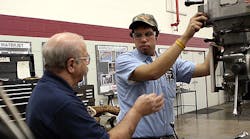Less than a year ago an idea emerged: we would help FM&T’s readers, and metalcasters generally, to understand how well their operations are competing. That is, we’d develop a series of benchmarks that foundries and diecasters could use to compare their processes, products, services, costs, and other performance standards, against the rest of the industry. It was to debut in this issue.
It wasn’t intended to solve problems. The hope was it would allow readers to view their own capabilities and to evaluate them against those of their competitors, to inform their understanding of themselves. From that, they could investigate ideas and practices that would set them apart from the competition. Our presentation would be a constructive way to help metalcasters to know “How am I doing?”
It didn’t happen, of course. The global economy collapsed. The metalcasting business froze in place. The responses we sought didn’t materialize as plant managers and operators declined to reveal (even confidentially) their data. Rather than share the information with the goal of improving everyone’s understanding of the industry, we found we had no data. Nothing from which to work, to build, or to develop.
This is emblematic of our time. Nearly everyone has been forced to accept an outcome different than what they had planned. They’re making do with the resources they can assemble. These aren’t the worst problems anyone ever faced, but because they represent such a reversal from our previous experience they confound us. And because of that, they linger.
All this is hard to accept, and its much harder to understand how we got ourselves into our rut. It’s even harder to know how to get out of it. Perhaps some of the “benchmark” approach applies?
First, don’t be persuaded by anecdotes or commentary asserting that “everyone is in the same position.” Is it true? No one knows, and it doesn’t matter. The point of benchmarking is not to standardize performances but to distinguish among competitors and to diversify approaches, so that advantages emerge for producers and consumers. Be determined to maximize your potential according to the opportunities available to you. If you’re the same as your competitors, you cannot be the best.
Next, assess your circumstances honestly and thoroughly. It may be as bad you suppose. It may be worse than that, but no one can mark improvement without a clear starting point.
Be diligent in seeking new approaches and applying strategies that will improve your circumstance. Keep an eye on what others are doing, but don’t stop asking, “How am I doing?” You’ll need to remember where you started, and you may need to reconsider your plans as you progress.
Resist the impulse to accept wholesale solutions. There are too many of them now, too many to be credible. Whatever the running commentary may imply, all of us cannot be rescued by stimulus plans. Bailouts that save some assets inevitably choose which ones will fail, too. These approaches create more losers than winners because they discourage the sorts of risks necessary to achieve growth. In this atmosphere, success accrues to the innovators, the independents.
Is this a plan for you? If not, get to work on your own approach. Know your potential. The difficulty of the current moment is that it lacks activity, the innovation that will spur growth overall.
In less than a year we’ve moved from a confident “How are we doing?” to an anxious “What comes next?” While very little seems to be working as planned, and as difficult as it is to maintain any plan, the greatest burden is the stress of anticipating what comes next. Don’t anticipate. Innovate.










